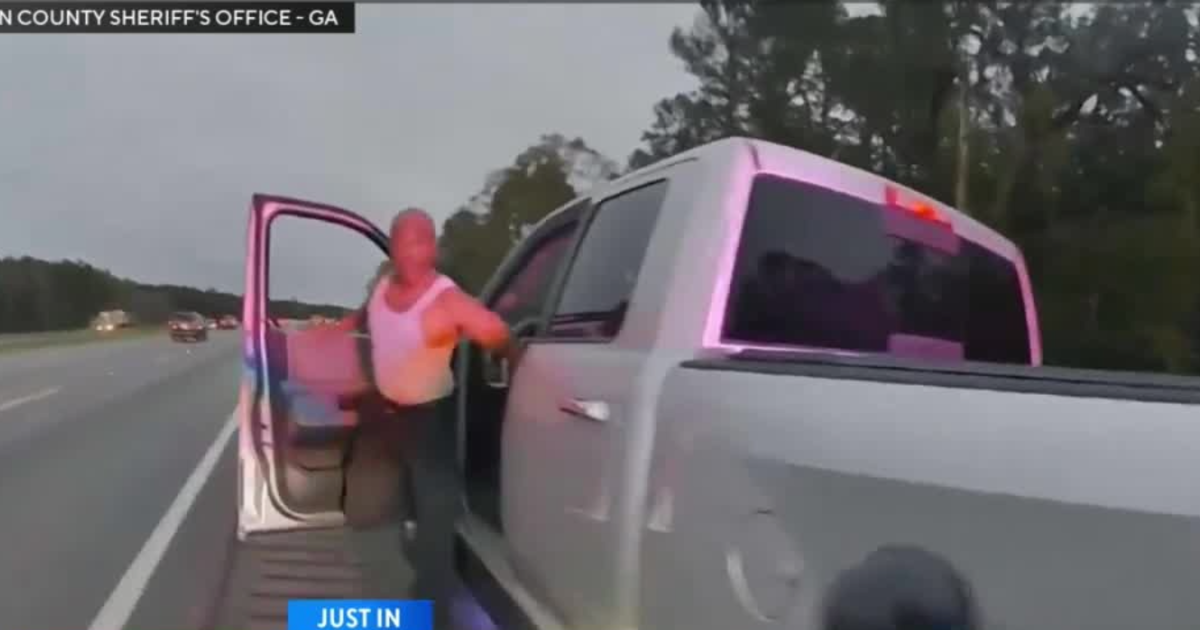On Wednesday, officials in Camden County, Georgia, released dash cam video footage capturing the encounter between Leonard Cure and a sheriff’s deputy moments before he was fatally shot during a traffic stop. The video shows Cure exiting his pickup truck before being shot by the deputy. Cure, 53, was stopped on Interstate 95 after speeding over 90 miles per hour. He had recently been released from a Florida prison after being wrongly convicted in 2003 for a drug store arrest in Broward County. Cure had been speeding and faced arrest for reckless driving, but instead, he was killed.
The graphic video from the sheriff’s office shows the moment the deputy shouted at Cure to step out of the vehicle and put his hands behind his back. Cure responded with defiance before going to the back of his truck and placing his hands on the pickup. The deputy threatened to tase him for his actions. A scuffle ensued, resulting in Cure being shot by the deputy. According to the Georgia Bureau of Investigation, Cure was compliant until he was told he was under arrest. The GBI stated that Cure disobeyed the officer’s commands and assaulted the deputy, which led to the use of a Taser, baton, and ultimately, a gun.
The GBI will review footage from the deputy’s body camera and patrol car dash camera, along with the officer’s statement and other evidence, before sending their findings to prosecutors. Civil rights attorney Ben Crump, representing Cure’s family, expressed a desire to see more video, including a live stream Cure supposedly initiated during the initial traffic stop. The family has doubts about whether the officers had a justifiable reason to use deadly force.
Before his wrongful conviction and subsequent release from prison three years ago, Cure had been working to rebuild his life. He gave inspirational speeches to high school students, held a security job, and was considering attending college after purchasing a home. Studies have shown that Black Americans face a disproportionate risk of being wrongfully convicted or killed by the police. The anxiety faced by those wrongfully imprisoned can be overwhelming, as they live with a constant fear of being taken back to jail or prison.
Cure was on his way home after visiting his ill mother when he was pulled over. Florida prosecutors who had worked on his case and supported his release were stunned by the news of his death. The deputy involved in the shooting has not been named but has been placed on administrative leave. The statistics on police killings and wrongful convictions show a clear racial disparity, with Black individuals being more likely to be victims of both.
Cure was sentenced to life in prison in 2003 for an armed robbery at a drug store in Dania Beach, Florida. It took a second trial to convict him after the first jury was deadlocked. In 2020, Broward’s Conviction Review Unit determined that Cure had solid alibis and no physical evidence or witnesses linking him to the crime. He was released in April of that year, and a judge later vacated his conviction and sentence. Cure received over $800,000 in compensation and educational benefits from the state of Florida. Despite his ordeal, those who interacted with Cure after his release described him as upbeat and excited to start his life anew.
Other exonerees have expressed that the fear of being wrongfully imprisoned again never truly goes away. Christopher Ochoa, who spent 12 years in a Texas prison for a murder he didn’t commit, still experiences nervousness when dealing with the police, even after being out of prison for two decades and pursuing a career in law. The trauma and lasting impact of wrongful convictions cannot be underestimated.
Despite the efforts to correct the injustices faced by Leonard Cure and others, incidents like his death serve as a reminder of the ongoing systemic issues surrounding race, policing, and the criminal justice system. Awareness and accountability are crucial in addressing and rectifying these deeply rooted problems.
Denial of responsibility! Vigour Times is an automatic aggregator of Global media. In each content, the hyperlink to the primary source is specified. All trademarks belong to their rightful owners, and all materials to their authors. For any complaint, please reach us at – [email protected]. We will take necessary action within 24 hours.


